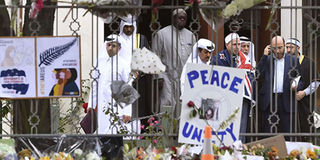Anti-human ideology fuelling terrorism

Members of Qatari delegation and religious leaders leave after the official handing over of the key at the Al Noor mosque as it is reopened in Christchurch, New Zealand, on March 23, 2019, following a massacre launched by a white supremacist. PHOTO | WILLIAM WEST | AFP
What you need to know:
- Careful observation of the history of terrorism will reveal that nothing much has changed, other than the justification for the taking of human lives.
- Perhaps we are going to have to identify the ideology behind terrorism in order to predict the kind of person that is most likely to be a threat to our continued peaceful coexistence.
Over the past few decades, global attention has been gripped by a form of religious intolerance that believes that it is okay to hasten the demise of those that you think are headed to hell anyway.
A brand of terrorism founded on the injunctions found in ancient ‘holy’ books has held humanity hostage for years, and we have found it hard to deal with it because of its close resemblance to our beliefs.
For long, it seemed that the only authentic believers in any of our major religions had no choice but to do things considered by rational people to be ‘extremist’, and the logical conclusion of those actions has often involved loss of lives.
The fear of the religious extremist has therefore found much justification given that most of our present-day conflicts have had a religious flavour.
FACE OF TERROR
And it has been extremely difficult to predict the actions of your average citizen due to the close resemblance of his religious views to those of the neighbourhood kooky terrorist.
This relatively “comfortable” perception was shattered in recent days when a white supremacist attacked a mosque in New Zealand, killing dozens of worshippers in a massacre he chose to livestream on social media.
The face of terror seems to have changed from a Middle-Eastern fanatic doing the bidding of what he perceived to be his deity, to a racist who believed that he was doing the world a favour by eliminating a class of people he thought do not deserve to live.
Careful observation of the history of terrorism will reveal that nothing much has changed, other than the justification for the taking of human lives.
RELIGION
While a long time ago the psychopaths among us used culture and made-up traditions to justify the elimination of people they did not like, in more recent times, we have used our religious beliefs as excuses.
As time goes by, those of us inhabiting this planet will have to agree that certain values and behaviours are not compatible with our continued survival.
Just the same way we agreed that there are certain behaviours that we must criminalise in order to ensure a relatively peaceful existence, we are also going to have to accept that certain psychopathic behaviours have become institutionalised in otherwise socially acceptable pursuits such as religion, education and leisure.
New terror threats are now being propagated in our institutions of learning and on social media, and we have to devise new ways of dealing with them.
IDEOLOGY
Perhaps we are going to have to identify the ideology behind terrorism in order to predict the kind of person that is most likely to be a threat to our continued peaceful coexistence.
I would posit that the core component of all terrorist thinking is an anti-human ideology that holds that some among us are not fit to live, and may be killed in order to strengthen that ideology.
Whatever its source, we must agree that it is not our way of life, and protect ourselves from those that would destroy the world in pursuit of their twisted goals.
The writer is Associate Professor of Psychiatry and Dean, Moi University School of Medicine. [email protected]





